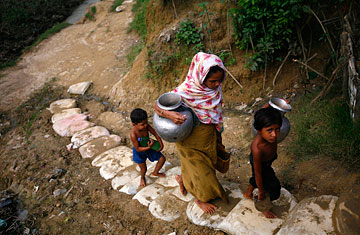
Rohingya refugees from Burma carry drinking water in a refugee camp in Bangladesh on Aug. 16, 2009
Hundreds of children flock at the site of a stranger in the Kutu Palong makeshift camp in southeastern Bangladesh, near the border with Burma. Some are wearing salvaged clothes; mostly, they are naked. "Hello, how are you?" they shout, repeating the one phrase they have picked up from the few aid workers that have gained permission from the Bangladesh authorities to enter the unregistered camp.
These kids are all Rohingya, a religious and linguistic ethnic minority from Burma's northern Rakhine State, who have been fleeing state-sponsored persecution in their homeland since 1978. In 1991, when the population experienced widespread repression and abuse from security forces posted in Rakhine, a quarter of a million crossed the border to Bangladesh seeking asylum. Most of them still live there today. Some 28,000 have been officially recognized as refugees and are living in a U.N.-run camp, waiting to be relocated to a third nation. Hundreds of thousands of others live outside these grounds, in the district of Chittagong or in unofficial camps, stateless and hopeless.
In recent months, Kutu Palong has become a refuge from a brutal crackdown on the Rohingya, according to a report issued Thursday by Médecins Sans Frontières (MSF). More than 6000 people have arrived in the camp since October as police and border authorities have launched an unprecedented crackdown in Bangladesh, pushing over 2,000 Rohingya back across the border into Burma. More than 500 were arrested around the country in January alone. MSF doctors working in Kutu Palong say they have been treating Rohingya who have been beaten and raped. "[Border guards] broke my fingers and then they threw me into the river and told me to swim back," says Ziaur Rahman, a 23-year-old who managed to escape and walk for three days to get medical care at the MSF clinic based outside the Kutu Palong makeshift camp.
About 30,000 Rohingya now live in the makeshift camp, in crude huts thrown together with bin liners, sticks and mud. Sanitation is minimal. Sewage facilities, hugely inadequate in the monsoon season, run alongside the housing. An earlier March 2009 MSF survey found that 40% of those who died in this unregistered camp in the first part of that year died from diarrhea. The government, however, has forbidden further development of the camps' infrastructure, so as not to attract any people more to the improvised settlement. "There is just one toilet between every 10 families," says Ziaul Haque, 40, who acts as a kind of camp administrator.
Bangladesh, like India, Thailand and Pakistan, is not one of 147 nations to sign the 1951 Refugee Convention, the global treaty that defines who is eligible for refugee status and what rights they are guaranteed. As a result, Dhaka has not registered a single refugee since 1991, and, as one of the most impoverished nations in the world, does not have the financial resources to cope with such a huge number of people. "We are a poor country and we have our own issues to deal with," says one local from Cox's Bazaar district, where the greatest concentration of Rohingyas live.
Though half of the Rohingya who make their way to Bangladesh are taken in by local families until they find their feet, it's been a fragile relationship. Many are competing for jobs with the Rohingya, who are often willing to work for less than Bangladeshis. Others worry that armed extremist gangs are radicalizing the youth of this marginalised, leaderless community, and suspicions of drug smuggling and an increase in petty crime in the camps have been recorded in the local press. With a new round of elections slated for later this year in Burma, locals are increasingly concerned that another exodus from its neighbor state may ensue and the situation in Bangladesh might further deteriorate.
The official channels of moving refugees to new homes has been slow. Since 2006, the United Nations High Commissioner for Refugees (UNHCR) has resettled 749 Rohingya from the registered camp. Five hundred were relocated in 2009 and another 190 are pending departure for the United Kingdom, Canada, Australia and the U.S. It's a rate of departure that barely covers the population growth of 2.9% within the registered camp; right now, the system is simply paying off the human interest.
Meanwhile, thousands wait, unregistered, and unsure of what their future holds. A visit of European Parliament members to the country this week to assess the situation may help highlight the suffering of a community and provoke a regional response to a challenge that today is being left to Bangladesh alone to grapple with. Leaving Kutu Palong, the children are still smiling, the chorus of 'hellos' replaced with 'goodbyes.' Many lives have begun in this camp in the last decade. Many will end here, too, without a birth or death certificate to prove that they ever existed.
